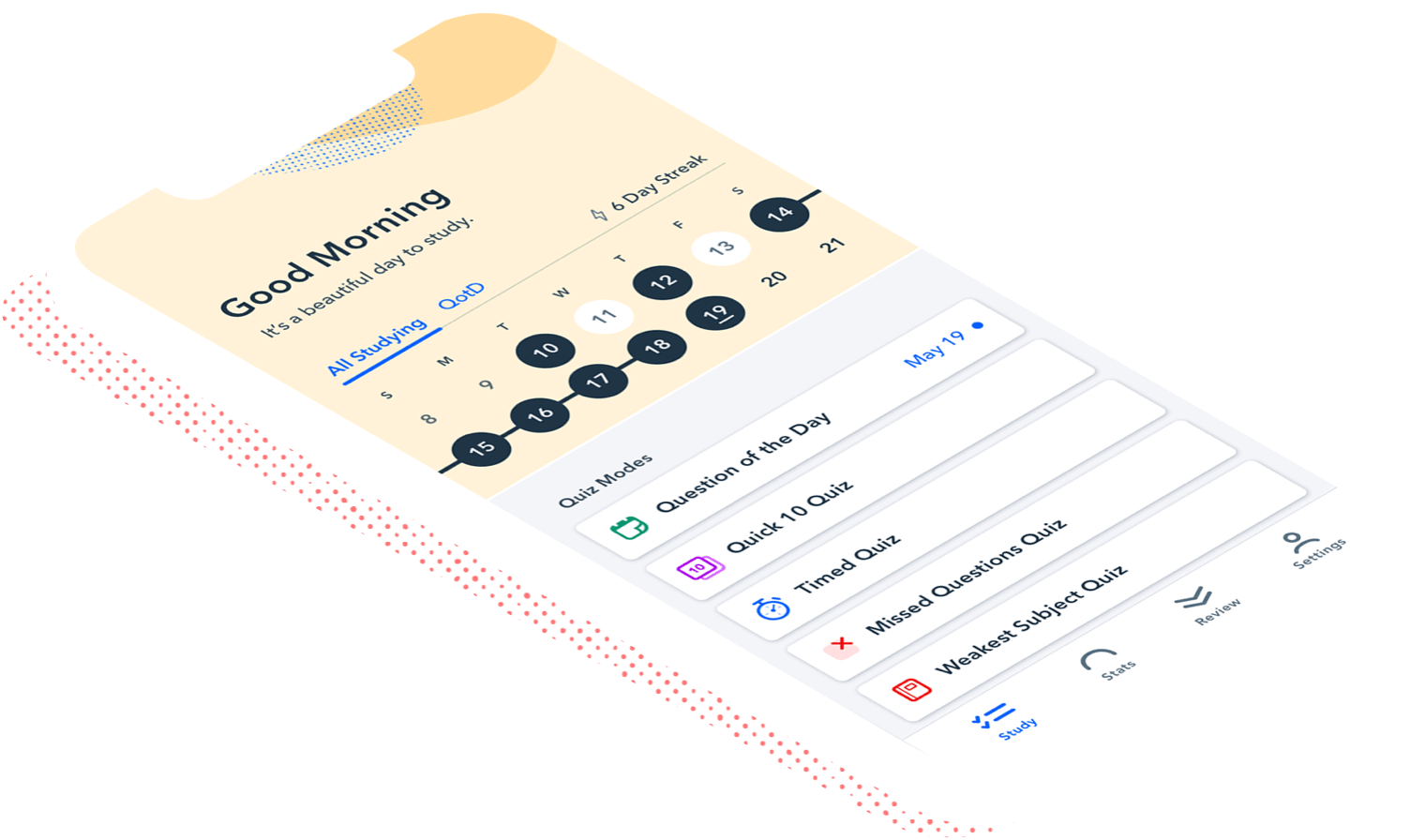Prep with the pros
This is what kicking down that door to your success and chopping it into tiny pieces feels like. At Pocket Prep, we’ve got your back as all of our practice questions are written by industry pros and are based on the latest exam outlines available. Plus, each question comes with a detailed explanation.
View all 4 NBCRNA CRNA Subjects
Basic Sciences
89%
8 of 9 Correct
Equipment, Instrumentation and Technology
56%
5 of 9 Correct
General Principles of Anesthesia
55%
6 of 11 Correct
Anesthesia for Surgical Procedures and Special Populations
38%
3 of 8 Correct
Our apps identify your trouble areas and give you the tools to turn them around.
Built for the busy
Study wherever, whenever with these quiz types:
Question of the Day
The quickest way to do a little studying everyday.
Quick 10 Quiz
10 questions randomly selected from the question bank.
Missed Questions Quiz
Retake questions you’ve missed and improve your overall score.
Level Up Quiz
Gamify your learning with progressively harder quizzes.
Weakest Subject Quiz
Focus on questions from your lowest subject score.
Timed Quiz
Have 5 or 10 minutes to invest in some study time?
Build Your Own
Select how many questions and what subjects to focus on.

See Your Progress
Detailed results show where you're doing well and where you should focus.
Gauge Where You Are
Your overall study score and how you compare to others.
Keep Up the Streak
A little each day helps you stay on track for your exam.
Make a profound  impact in patient care by passing the Nurse Anesthetist National Certification Examination.
impact in patient care by passing the Nurse Anesthetist National Certification Examination.
 impact in patient care by passing the Nurse Anesthetist National Certification Examination.
impact in patient care by passing the Nurse Anesthetist National Certification Examination.
The NBCRNA Certified Registered Nurse Anesthetist (CRNA) exam is for nurses seeking nurse anesthesia certification. Offered by the National Board of Certification and Recertification for Nurse Anesthetists (NBCRNA), this certification confirms your ability to provide anesthesia care in a variety of settings.
The Basic Sciences section (20%) covers detailed topics such as anatomy, physiology, pathophysiology, pharmacology, and applied chemistry, physics, and mathematics. It includes a deep dive into the cardiovascular, respiratory, and central nervous systems, as well as pharmacological principles crucial for anesthesia practice. The Equipment and Technology section (20%) evaluates familiarity with anesthetic delivery systems, airway equipment, monitoring devices, and patient warming equipment, ensuring proficiency in the tools essential for safe anesthesia care. The General Principles of Anesthesia section (35%) emphasizes ethical considerations, patient safety, preoperative assessment, fluid management, airway management, and postoperative care, focusing on the comprehensive management of anesthesia practice. Lastly, the Anesthesia for Surgical Procedures and Special Populations section (25%) covers the anesthesia management for various surgical procedures, including intra-abdominal, cardiac, neuroskeletal, and orthopedic surgeries, as well as the unique considerations for pediatric, obstetric, geriatric, obese, and immune-compromised patients, ensuring CRNAs are prepared to provide safe and effective anesthesia care across diverse clinical scenarios.
Eligibility for the National Certification Examination (NCE) requires completing an accredited nurse anesthesia educational program and holding a current RN license. Each candidate must answer at least 100 questions on the NCE, with the test continuing until their performance is determined to be above or below the passing standard. The number of questions varies for each candidate, with a maximum of 170 questions within a three-hour testing period. The CRNA credential is valid for four years, with recertification options available through continuing education or re-examination.
Exam Info & Registration
NCE Handbook - Version 04.01
NCE Content Outline - January 2024
The Basic Sciences section (20%) covers detailed topics such as anatomy, physiology, pathophysiology, pharmacology, and applied chemistry, physics, and mathematics. It includes a deep dive into the cardiovascular, respiratory, and central nervous systems, as well as pharmacological principles crucial for anesthesia practice. The Equipment and Technology section (20%) evaluates familiarity with anesthetic delivery systems, airway equipment, monitoring devices, and patient warming equipment, ensuring proficiency in the tools essential for safe anesthesia care. The General Principles of Anesthesia section (35%) emphasizes ethical considerations, patient safety, preoperative assessment, fluid management, airway management, and postoperative care, focusing on the comprehensive management of anesthesia practice. Lastly, the Anesthesia for Surgical Procedures and Special Populations section (25%) covers the anesthesia management for various surgical procedures, including intra-abdominal, cardiac, neuroskeletal, and orthopedic surgeries, as well as the unique considerations for pediatric, obstetric, geriatric, obese, and immune-compromised patients, ensuring CRNAs are prepared to provide safe and effective anesthesia care across diverse clinical scenarios.
Eligibility for the National Certification Examination (NCE) requires completing an accredited nurse anesthesia educational program and holding a current RN license. Each candidate must answer at least 100 questions on the NCE, with the test continuing until their performance is determined to be above or below the passing standard. The number of questions varies for each candidate, with a maximum of 170 questions within a three-hour testing period. The CRNA credential is valid for four years, with recertification options available through continuing education or re-examination.
In 2023, 3,008 candidates took the NCE and the reported pass rate was 83%.
This app allowed me to study on the go throughout my day, during down time. Highly recommend.


Nursing
NBCRNA CRNA is part of our Nursing Pocket Prep that contains prep content for 35 other Nursing exams.
View
other 35 Nursing exams
AACN CCRN® (Adult)
Critical Care Registered Nurse (Adult)
AACN CCRN® (Neonatal)
Critical Care Registered Nurse (Neonatal)
AACN CCRN® (Pediatric)
Critical Care Registered Nurse (Pediatric)
AACN PCCN®
Progressive Care Registered Nurse
AANPCB® FNP
Family Nurse Practitioner
AANPCB® PMHNP-C
Psychiatric-Mental Health Nurse Practitioner
ABNN SCRN®
Stroke Certified Registered Nurse
ABPANC CAPA®
Certified Ambulatory Perianesthesia Nurse
ABPANC CPAN®
Certified Post Anesthesia Nurse
AMCB CNM
Certified Nurse-Midwife
ANCC AGACNP-BC
Adult-Gerontology Acute Care Nurse Practitioner
ANCC AGPCNP-BC
Adult-Gerontology Primary Care Nurse Practitioner
ANCC AMB-BC™
Ambulatory Care Nurse
ANCC CV-BC™
Cardiac-Vascular Nurse
ANCC FNP-BC™
Family Nurse Practitioner
ANCC PMHNP-BC
Psychiatric-Mental Health Nurse Practitioner
ANCC MEDSURG-BC™
Medical-Surgical Nurse
ANCC NE-BC®
Nurse Executive
ANCC NPD-BC™
Nursing Professional Development
BCEN CBRN®
Certified Burn Registered Nurse
BCEN CEN®
Certified Emergency Nurse
BCEN CFRN®
Certified Flight Registered Nurse
BCEN CPEN®
Certified Pediatric Emergency Nurse
BCEN CTRN®
Certified Transport Registered Nurse
BCEN TCRN®
Trauma Certified Registered Nurse
CBDCE CDCES
Diabetes Care and Education Specialist
CCI CFPN®
Certified Foundational Perioperative Nurse
CCI CNAMB®
Certified Ambulatory Surgery Nurse
CCI CNOR®
Certified Perioperative Nurse
CCMC CCM®
Certified Case Manager®
MSNCB CMSRN®
Medical-Surgical Registered Nurse
NLN CNE®
Certified Nurse Educator
PNCB CPN®
Certified Pediatric Nurse
PNCB CPNP-AC®
Certified Pediatric Nurse Practitioner – Acute Care
PNCB CPNP-PC®
Certified Pediatric Nurse Practitioner – Primary Care
Show up
 confident
confident
on test day
 confident
confident
on test day
Pocket Prep, Inc. is neither affiliated with nor endorsed by any of the organizations listed. All organizational and test names are trademarks of their respective owners.


 Study Questions
Study Questions
 5 Star Reviews
5 Star Reviews
 Avg App Store Rating
Avg App Store Rating








